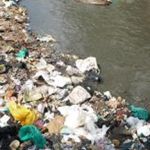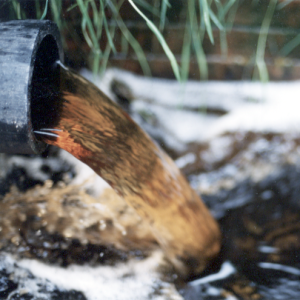What is Leachate?
 The purpose of this section of our web site is to inform newcomers about the most common liquid referred to as, leachate – landfill leachate.
The purpose of this section of our web site is to inform newcomers about the most common liquid referred to as, leachate – landfill leachate.
This whole web site has been written to answer the question; “What is leachate?” and how to ensure it does not cause pollution, in detail. So, we suggest that byexploring our site further you will find a more comprehensive answer to “What is leachate?, if you need it.
For now, we will give you the most concise answer to the question of what leachate is, by providing our definition of leachate below:
[hr]
The Definition of Leachate
Leachate is the liquid that drains or ‘leaches’ from a landfill. It varies widely in composition regarding the age of the landfill and the type of waste that it contains. It usually contains both dissolved and suspended material.
In fact the term “leachate” is so often applied to landfill leachate, both within the waste management industry and outside, that it is easy to forget that leachate is the term used for any liquid produced by the action of “leaching”. Leaching occurs when water percolates through any permeable material.
[hr]
Having Read the Answer to “What is Leachate” Most People Dislike It!
 Once many people have the answer to their first question of; “What is leachate?”, they realize that it is pretty unpleasant stuff (it smells, can cause pollution etc.). Naturally,they often react by saying they would rather it was not produced. “Let’s not have any around here then”, being a common sentiment expressed!
Once many people have the answer to their first question of; “What is leachate?”, they realize that it is pretty unpleasant stuff (it smells, can cause pollution etc.). Naturally,they often react by saying they would rather it was not produced. “Let’s not have any around here then”, being a common sentiment expressed!
In most temperate and tropical climates, landfills will unavoidably produce some leachate. To stop producing any leachate would in most cases entail sending “zero waste to landfill”. At the present time only a very few (probably less than a dozen) sizeable communities have been able to achieve what is known as “zero waste”. That means, for most of us that there will still have to be actively operating landfills in our area.
No matter how hard landfill designers and operators try to avoid generating waste, through waste reduction, re-use, recycling, composting. Not to mention the many other methods of waste pre-treatment prior to landfilling. Landfilling will continue for many years yet, and thus leachate generation and its safe disposal without causing pollution, is a problem which is here to stay.
Even if all the landfills could be closed, and the creation of new leachate from rainfall falling on open (operational) landfill phase surfaces, could be stopped today, we would still have to manage the leachate from both the present operational sites,and all the old closed landfills.
There are many thousands of existing operational and closed landfill sites, which will continue to produce leachate for generations. For that reason following good practice in leachate minimisation, collection, treatment and disposal, is a very important part of the job of any landfill operator.

I’m in my home town of Ocotlan,Jalisco,Mexico down here even though they have an understanding of what good trash separation should be,they don’t fully understand that separation is the first step and if not done correctly oh well we are wiasting a lot of time.That’s first,getting to the Leachate,they have no idea what damage it will do or is doing to the surrounding land and water table for that matter.I like my town and understand that money is tight but to openly disregard the danger that the Leachate will do is wrong,HELP.How to handle this,please if you have any suggestions,share them and I will pass them on.Or better yet I will eventually give you there email address,thanks
In my hometown of Tellicherry, Kerala, India, there is no proper waste disposal system by the administration. The most common leachate problem experienced at micro level is at any home which had celeberated some event and disposed the remnant food in a mud pit dug for the purpose. Since the well is situated anywhere within 20 metres from the pit, leachate badly affects the well water immediately after wards. Please advise what can be done at micro level (we cannot avoid disposing the waste in the pit because the municipality does not allow these to be disposed off otherwise)
You pay me a great compliment by implying that I have an answer. Unfortunately, I don’t have an instant solution, and if there was one I am sure that you would know of it. All I can suggest is that composting and anaerobic digestion can be used instead of burying, in a way that uses the composted solids as a soil improver, and the liquid leachate (or in the case of anaerobic digestion the “digestate”), also spread on the land as a fertilizer.
Need of leachate treatment?
Objective if leachate treatment?
Scope of the project on leachate?
Pingback: Satisfied with your glass of water? Think again. | variasdaniel
Pingback: Don’t Drink the Water | Trash Talk
Pingback: I Made The Plunge (My Recent Diaper Saga) | very civilly yours
Pingback: Why I’m Talking Trash – Trash Talk 365
Pingback: Don't Let Your Waste Haunt You! Green your Halloween with Pumpkin Composting - SCARCE
Pingback: Waste – The painful impact – florafaunaweb